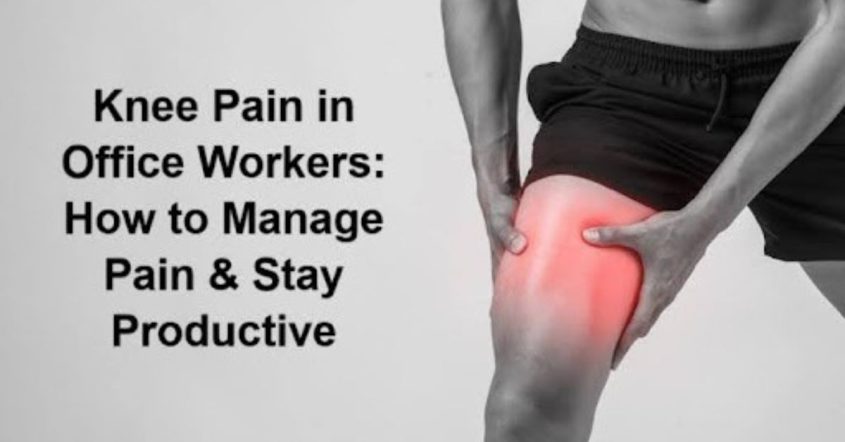Knee pain can make an already long day feel so much longer if one’s work requires repetitive movements, extended sitting, or standing for long hours. Pain in the knee that occurs in the workplace is quite common, but the good news is that one can work on it with adequate measures.
We know how difficult it is sometimes to get work done when you are working with an ache. How to prevent and relieve knee pain at work? We should discuss the causes of it and be able to offer you some practical tips.
Common Causes of Knee Pain in Office Workers
1. Prolonged Sitting
Sitting with a slouch in your chair, or legs tucked in, can cause uneven pressure on the knees. This can either irritate the knee joint or lead to muscle imbalances around the knees and hips.
2. Poor Posture
Sitting with your legs hidden under you or slouching on your chair causes an unequal pressure on your knees. Such pressure may induce muscle imbalances in the knees and hips or flare up the knee joints.
3. Lack of Movement
Regular activity is so important to make your muscles and joints strong and healthy. Your knees require natural movement, which is reduced when you sit for extended periods of time without taking breaks. This lack of mobility leads to weakened muscles and decreased joint support.
4. Improper Ergonomics
When desks or chairs are not correctly supported, and are too high or too low will affect your posture, which will result in improper alignment of the knees. When your feet are hanging or not pressed fully on the floor, this may exert stress on your lower legs and knees.
5. Excess Body Weight
If one is overweight, they would have more strain on their knees while getting out of a chair or climbing stairs. A sedentary lifestyle with poor eating habits leads to weight gain, which is linked to knee pain. It is a common trait among office workers.
6. Weak Muscles
In case you have weak core, hips, or leg muscles, it can cause your knees to perform more work as compared to normal. In the long term, such an imbalance may result in knee pain.
Effective Stretches for Knee Pain Relief
Stretching is another way of getting rid of stiffness and enhancing blood flow, and relieving the pain around the knees. The following are some of the exercises that can help office employees.
1. Hamstring Stretch
The hamstring muscles are the muscles located on the back of your thigh, and these muscles are connected to the knee. Tight hamstrings might have a pulling effect on the knee joint and become painful.
How to do it:
- Stretch one leg straight out on a raised platform of any kind, such as a curb, step, or a foot-stool.
- The spine should be straight but at hip accentuation; that is, the chest should be brought towards the thigh.
- Hold for 20-30 seconds.
- Switch legs.
2. Calf Stretch
Knee mobility and stability can be impacted by tight calves.
How to do it:
- Stand facing a wall.
- Place both hands on the wall.
- Step one foot back and press the heel down.
- Keep the back leg straight and bend the front knee slightly.
- Hold for 20 to 30 seconds.
- Switch legs.
3. Quadriceps Stretch
The quadriceps, which are front thigh muscles, assist in the movement of the knees. By stretching thereof, stress on the joint can be reduced.
How to do it:
- Stand next to a chair or wall for support.
- Grab your right ankle with your right hand and gently pull your heel toward your buttocks.
- Keep your knees close together.
- Hold for 20 to 30 seconds.
- Switch legs.
4. Seated Leg Extensions
The movement assists in the activation of the quadriceps and enhances the knee range of movement.
How to do it:
- Sit straight on your chair.
- Gradually straighten a leg at the same time, trying to make it parallel to the floor.
- Keep it in that position, a few seconds, and then drop it down.
- Do this about 10-15 repetitions with each leg.
5. Heel Slides
Heel slides assist in enhancing knee flexibility.
How to do it:
- Sit or lie on your back with your legs stretched.
- Take one heel and slowly slide it toward your hips, bending your knee as far as comfortable.
- Move it to the point where it was in the beginning.
- Do this about 10-15 repetitions with each leg.
Some Common Tips to Prevent Knee Pain
Stretching and some small adjustments can help in supporting the knee and reducing pain. Some of the common adjustments include:
1. Adjust Your Desk Setup
Keep feet flat on the floor while knees are maintained at a 90-degree bend. You can also use a footrest if necessary. Allow your chair to support the lower back and thighs adequately.
2. Movement Breaks
Take short breaks after every 30 to 60 minutes. You can just stretch, stand, or go for a short walk. These breaks enhance blood flow and avoid stiffness.
3. Remain Active Outside of Work
Daily physical exercise, such as walking, swimming, or cycling, will help make the muscles around the knees stronger and enhance joint health.
4. Monitor Your Weight
Maintaining a healthy weight relieves extra strain on your knees.
5. Wear Right Footwear
Choose footwear that will support your feet. Avoid wearing extremely flat, cushionless shoes or high heels.
When to See a Doctor
You will be required to visit a doctor or a physical therapist if the knee pain doesn’t improve or remains the same, and you are not able to easily perform everyday activities. When a person has chronic pain in the knees, this is an indication that something is wrong. A person needs professional assistance in the form of arthritis, tendonitis, or a problem with the meniscus.
A certified and the best knee pain doctor in India should be approached for good treatment and easy recovery
Conclusion
Knee pain in office workers is often due to sitting for long hours, poor posture, and lack of movement. Fortunately, simple stretching exercises and lifestyle changes can give relief and prevent further discomfort.
By moving regularly during the day and paying attention to how you sit, you can support your knee health and overall comfort at work. You can search for the best knee pain treatment in Delhi easily.
















